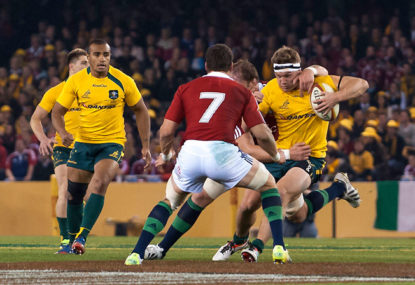New Zealand is a complete team, with smart pace, power in almost every position, depth to die for and canny experience that nobody calls ‘old’.
They have composure when down late in a Test match, residual fitness, the ability to switch styles if needed and the situational awareness to overcome bad refereeing, yellow cards, breakdown chaos, scrum lotteries or inferior territory and possession.
But the All Blacks lose every now and then, and like with any rugby team it is because they are missing something that day.
In these occasions New Zealand cannot live without turnover ball. I think that is their necessary ingredient to win on a day when they are not firing on all cylinders.
The Springboks are less well-rounded, but are usually the favourites to win (and do win) most of the time, too. South Africa aren’t good when the ‘Boks don’t have an abrasive blindside flanker on the field with an actual open side deck-player. Also, South Africa cannot live without collisions that go the Springboks’ way.
We saw on this latest tour to Europe that trying to roll opposing packs with Oupa Mohoje at blindside flank just is not effective. Also, Marcell Coetzee gives all he has, and is an excellent blindside in his own right, but he still is no Francois Louw, who belongs in that small group of borderline insane loose forwards.
Like David Pocock, Richie McCaw, Heinrich Brussow, George Smith, Sam Cane and Sam Warburton, Louw can actually play the ball on the deck in a high percentage of breakdowns (and illegally in rucks) to slow the opposition down or pilfer or demand bodies to prevent the pilfer.
So, the Springboks cannot live without a true open side 80-minute pest playing alongside a 60-minute blindside battle-axe (Willem Alberts, Schalk Burger and Arno Botha), spelled by a 20-minute blindside berserker (Coetzee, Nizaam Carr, Siya Kolisi, Lappies Labuschagne or Juan Smith).
In addition, I believe South Africa cannot live with multiple kicking errors or errors of the boot at critical times. Missed penalty touch-finders, too many missed kicks at goal, poor box kicks, punts out on the full and badly executed chips and grubbers.
Can any team survive a bad kicking day? Yes, but not South Africa.
Australia cannot live without a serviceable scrum. The Wallabies are smart enough in the back line to not need a dominant scrum, but they can’t win if they are manhandled as at Twickenham this year or in Cape Town in 2013.
Also, Australia must have two playmakers, because that is how they play in the backs. And the Wallabies cannot live without a real breakdown menace. I’ve yet to be persuaded that Michael Hooper is that player, even though he is maybe the most compelling forward to watch, with his off-the-chart speed and conditioning.
Argentina cannot live without all their real professional players. And they cannot win when they play too open a game, because their forwards cannot get to the wide channels in time and they are turned over or sloppy ball results, leading to comical tries like Ruan Pienaar assisting Bryan Habana for a soccer try in Argentina.
England will not win the big games consistently without more skilled footballers at the back, and a real opensider in the front. Chris Robshaw can be a pest, and he is superbly conditioned, but like Hooper, he cannot really bother Louw or Pocock or McCaw for all 80 minutes. In the flyhalf and centre channels, England are even more predictable than South Africa.
Ireland cannot live outside Dublin. Maybe they can win in New Zealand against Australia. But for the most part, they are a home team. When they leave Dublin, they are shorter, slower and less clever.
Wales cannot live without superlative games by their best players. If Warburton, Leigh Halfpenny, Jamie Roberts or their big wingers let them down, they lose. Typically, their losses come when their top players are absent or quiet and the lesser lights have to make big decisions.
France cannot live without passion. French rugby is one of my favourite non-South African cultures, and it is typified (especially in the South) by a rugged desire for combat and scrums and taking chances.
The fans are incredibly knowledgeable and oddly fickle. When France shows up with a passive air, it’s over. When they pitch in, as at the World Cup in 2011 when I saw their pre-game drills for the England pool game, they’re tough to eliminate.
What do you think your teams cannot live without?





























































































